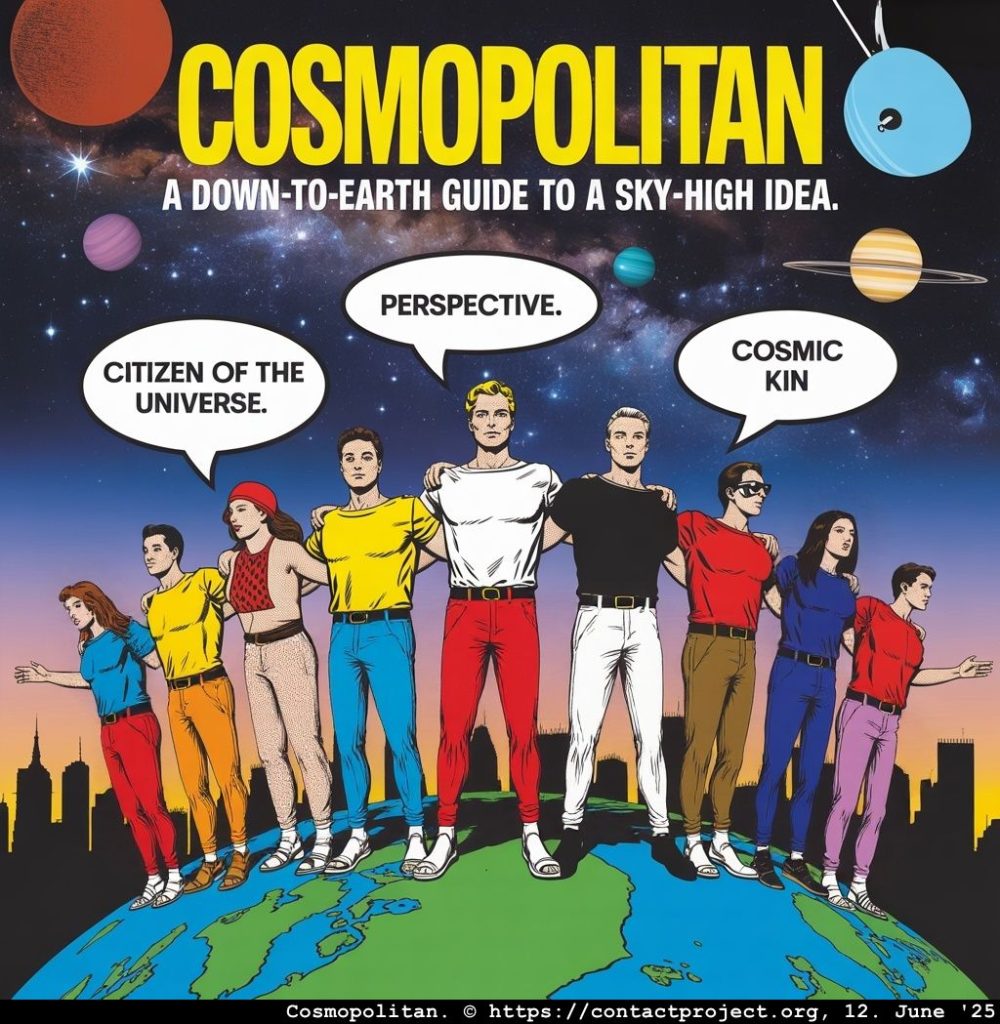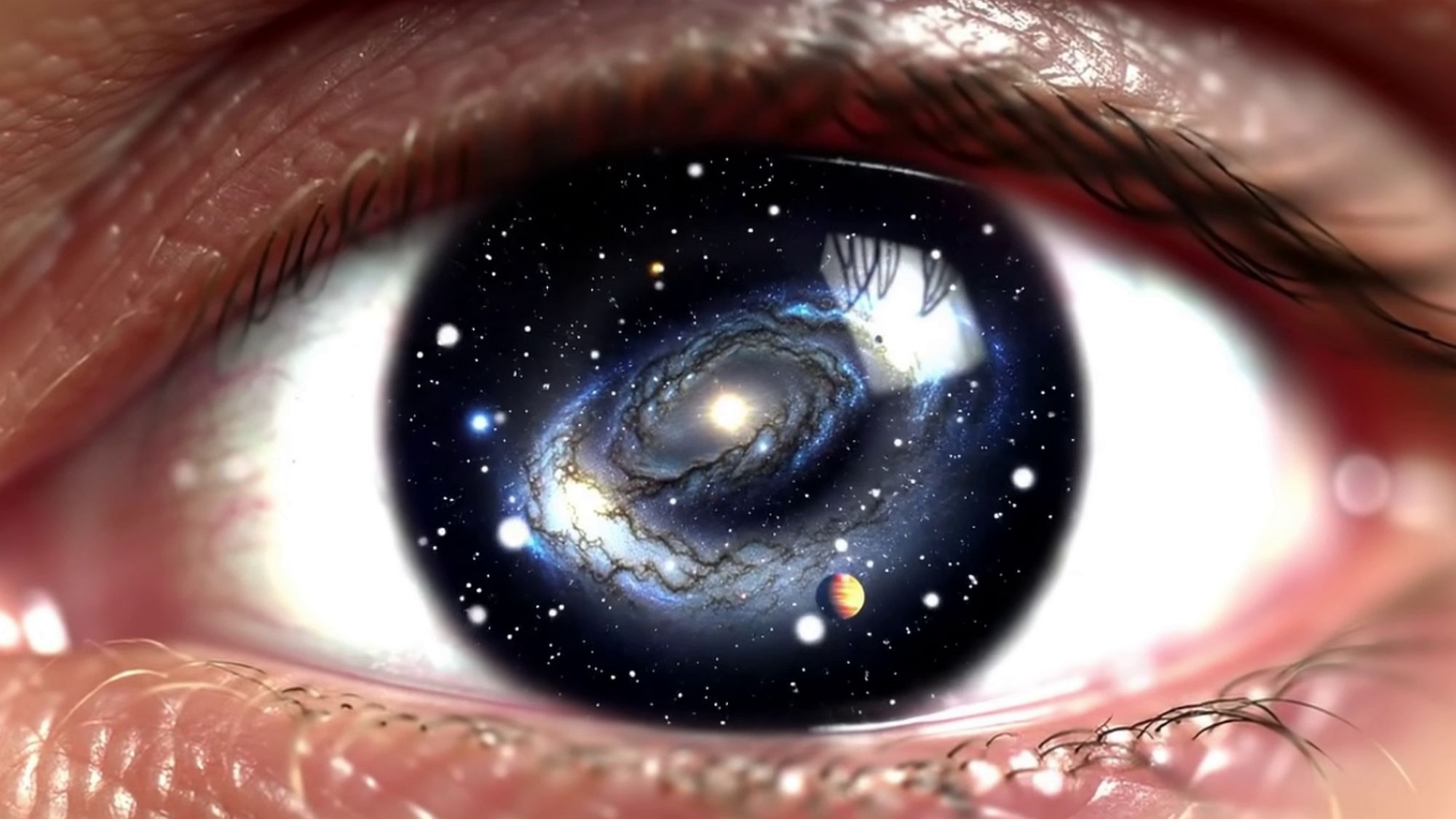
1. The word in a nutshell
• Cosmos = the whole universe (all planets, stars, and space)
• Polis / polites = city / citizen
Put them together and you get “citizen of the universe.”
2. A quick trip back in time
Imagine ancient Greece around 350 BCE. Most folks are fiercely loyal to their own city-state: Athens, Sparta, Corinth, and so on. One day the famously blunt philosopher Diogenes is asked where he comes from. Instead of naming his hometown, he shrugs and says, “I am a citizen of the world.” Mic drop. With that one line he tells everyone their local labels don’t impress him; he belongs everywhere and nowhere at once.
A few decades later the Stoic thinkers (think of them as the practical philosophers of the day) grab that idea and run with it. To them, every person is part of one giant family ruled by reason and nature’s laws. Under their view, treating a foreigner badly makes as little sense as mistreating your own brother or sister.
3. Fast-forward to today.
Ask people now what “cosmopolitan” means, and you’ll hear things like:
• “Someone who’s traveled a lot.”
• “Speaks a few languages.”
• “Feels at home in New York, Tokyo, or Nairobi.”
All true. Modern life adds trains, planes, and the internet to the mix, so being “worldly” is easier than ever. But the old, bigger sense – citizen of the universe – still lurks beneath the surface, and it matters more than you might think.
4. Why the cosmic angle still matters
• Perspective. Step outside on a clear night, look up, and remember Earth is one tiny rock out of billions. Problems that seem huge – an annoying neighbor, a traffic jam – shrink a little.
• Common ground. Whether you’re in Brazil or Bangladesh, people laugh, worry about their kids, and enjoy tasty food. Seeing yourself as “cosmic kin” makes it easier to respect those different from you.
• Shared responsibility. If we all ride on the same blue marble, trashing the oceans or overheating the planet hurts the whole crew. A cosmopolitan mind-set nudges us to think twice before saying, “Not my problem.”
5. Signs you’re becoming cosmopolitan
![]() You’re curious about how other people live, not judgmental.
You’re curious about how other people live, not judgmental.
![]() You can enjoy sushi tonight, tacos tomorrow, and Ethiopian injera on Saturday – no food snobbery, just enthusiasm.
You can enjoy sushi tonight, tacos tomorrow, and Ethiopian injera on Saturday – no food snobbery, just enthusiasm.
![]() You listen to news from outside your own borders.
You listen to news from outside your own borders.
![]() You’re comfortable saying, “I don’t know – tell me more.”
You’re comfortable saying, “I don’t know – tell me more.”
6. How to grow your cosmic citizenship badge
• Travel if you can, but if not, let books, films, or online forums be your passport.
• Learn a few phrases in another language. Even “hello” and “thank you” go a long way.
• Swap stories with immigrants or exchange students in your town.
• Look up at the stars once in a while; download a stargazing app and find Mars or the Andromeda Galaxy. Nothing makes the universe feel real quite like spotting another galaxy with your own eyes.
• Get involved in causes that cross borders – climate action, global health, disaster relief. Small donations or volunteer hours matter.
7. A quick reality check
Being cosmopolitan doesn’t mean ditching your roots. Loving your hometown team or your grandma’s cooking is perfectly compatible with caring about the rest of humanity. Think of it as expanding the circle, not erasing it.
8. The takeaway in plain English
“Cosmopolitan” isn’t just a fancy word for someone who drinks cocktails at airport lounges. It’s a 2,000-year-old reminder that we all share the same cosmic address. Whether we’re talking about neighborhood barbecues or distant galaxies, we’re traveling this journey together. See yourself as a citizen of something bigger, act like it, and the world – and maybe even the universe – becomes a friendlier place.
#cosmopolitan #cosmopolitanliving #cosmopolitanism #Cosmos #citizenofthecosmos #citizenoftheworld #CosmicHeritage #ExtraTerrestrial #ExtraterrestrialContact
